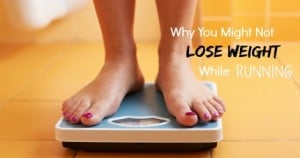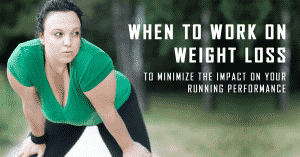The first thing we need to discuss when it comes to Ideal Race Weight is that losing weight won’t always result in an increase and performance.
Moreover, losing too much weight will have a negative impact on performance. But why?
Basically, this is the result based on the law of diminishing returns.
It won’t surprise you to learn that generally the heavier you are, the more excess weight you have. And, as you lose weight you’ll be shedding almost exclusively fat.
This means that you’ll see a greater reduction in race times when you go from 40 to 20 pounds overweight.
However, if you’re already close to your ideal weight, losing weight won’t just come from fat, but muscle too. This means that further weight loss will only have a slight impact on your times.
Even further, if you lose too much weight and get below your ideal race weight, then your performance is going to suffer.
So, why does this happen?
Muscle vs Fat
Without getting too scientific, running fast is a combination of how efficiently you’re able to generate power and how efficiently your metabolic systems can function.
Efficient power is basically how strong and forcefully your muscles can contract to move you along at your goal pace. This can be impacted by a number of factors, but mainly how strong you are and how much weight you need to move.
As such, if you’re able to lose fat (which doesn’t help at all with generating power) then you’ll generate more power at the same strength levels because you have less total weight to move.
But, this is where the balance comes into play.
Once you reach a certain body fat percentage, no matter how much you try, losing weight will also result in a loss of muscle.
With diet and strength training you can keep a higher percentage of weight loss as fat, but you can’t completely eliminate muscle loss.
So, now you’re losing weight, but you’re also losing some of your ability to generate power.
Therefore, the rate at which your performance will improve will slow down.
Now, if you continue to lose weight beyond your ideal weight, you’ll be losing too much muscle to continue to generate efficient power and your times will slow.
Increased Risk of Injury
Another danger of getting closer and closer to your ideal race weight is that the risk of injuries increases.
This is partially caused from less nutrients in your diet (while you’re losing the weight), less available nutrients (if your weight is too low), and less muscle to help the absorb the impact from all your miles.
In fact, a series of studies conducted by Jack Taunton and other researchers at the University of British Columbia in Canada in 2002 and 2003 showed that women who had a BMI less than 21 were more prone to stress fractures and men whose BMI was greater than 26 actually had a lower risk of injury.
Fueling
Finally, the other major issue when it comes to shedding pounds to reach your ideal race weight is that your ability to fuel your body is compromised.
While you’re losing weight, and if near or below your ideal, you have less nutrients available to jump start your recovery. Your body needs carbohydrates, protein and even fat to recover.
Moreover, you likely won’t have optimal energy levels to complete your workouts. This means that your training is going to suffer.
When your training suffers, your race times suffer.
What this all means for you
All this means is that once you start approaching your ideal race weight, focusing on weight as performance improvement metric is not effective.
The closer you get, the more diminished your returns will be and the more likely it is you’ll trigger injuries or a decline in performance.
This is why our Ideal Running Weight Calculator may produce an error or a warning if your goal is to lose too much weight and as you get closer to your ideal.
Moreover, there’s a balance you need to strike between losing weight and fueling when it comes attaining your ideal weight.
You need to make sure you’re losing weight the right way (maintaining muscle), slowly enough to still fuel your training, and at the right time in your training cycle.
If you need help with this, check out our Nutrition for Runners Course. We walk you through the entire process with a 30 day program, meal plans, helping you find the right diet, and more.
Hopefully, after reading this article you understand the science behind your ideal running weight and why absolute numbers on the scale won’t always help your running.




